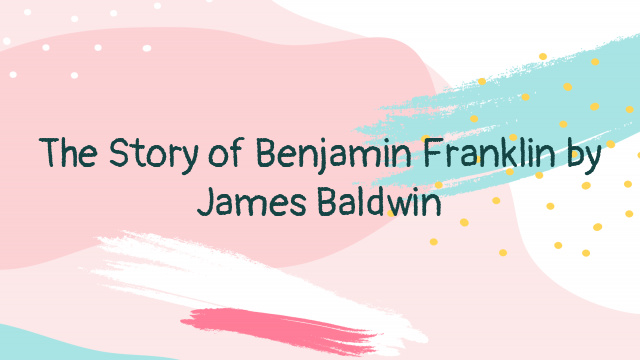
The Story of Benjamin Franklin by James Baldwin
Chapter VII: The First Day in Philadelphia
There are two ways of going from New York to Philadelphia.
One way is by the sea. The other is by land, across the state of New Jersey. As Franklin had but little money, he took the shorter route by land; but he sent his little chest, containing his Sunday clothes, round by sea, in a boat.
He walked all the way from Perth Amboy, on the eastern shore of New Jersey, to Burlington, on the Delaware river. Nowadays you may travel that distance in an hour, for it is only about fifty miles.
But there were no railroads at that time; and Franklin was nearly three days trudging along lonely wagon-tracks, in the midst of a pouring rain.
At Burlington he was lucky enough to be taken on board a small boat that was going down the river.
Burlington is only twenty miles above Philadelphia. But the boat moved very slowly, and as there was no wind, the men took turns at rowing.
Night came on, and they were afraid that they might pass by Philadelphia in the darkness. So they landed, and camped on shore till morning.
Early the next day they reached Philadelphia, and Benjamin Franklin stepped on shore at the foot of Market street, where the Camden ferry-boats now land.
No one who saw him could have guessed that he would one day be the greatest man in the city.
He was a sorry-looking fellow.
He was dressed in his working clothes, and was very dirty from being so long on the road and in the little boat.
His pockets were stuffed out with shirts and stockings, and all the money that he had was not more than a dollar.
He was hungry and tired. He had not a single friend. He did not know of anyplace where he could look for lodging.
It was Sunday morning.
He went a little way up the street, and looked around him.
A boy was coming down, carrying a basket of bread.
“My young friend,” said Franklin, “where did you get that bread?”
“At the baker’s,” said the boy.
“And where is the baker’s?”
The boy showed him the little baker shop just around the corner.
Young Franklin was so hungry that he could hardly wait. He hurried into the shop and asked for three-penny worth of bread.
The baker gave him three great, puffy rolls.
Franklin had not expected to get so much, but he took the rolls and walked out.
His pockets were already full, and so, while he ate one roll, he held the others under his arms.
As he went up Market street, eating his roll, a young girl stood in a doorway laughing at him. He was, indeed, a very funny-looking fellow.
The girl’s name was Deborah Read. A few years after that, she became the wife of Benjamin Franklin.
Hungry as he was, Franklin found that he could eat but one of the rolls, and so he gave the other two to a poor woman who had come down the river in the same boat with him.
As he was strolling along the street he came to a Quaker meeting-house.
The door was open, and many people were sitting quietly inside. The seats looked inviting, and so Franklin walked in and sat down.
The day was warm; the people in the house were very still; Franklin was tired. In a few minutes he was sound asleep.
And so it was in a Quaker meeting-house that Benjamin Franklin found the first shelter and rest in Philadelphia.
Later in the day, as Franklin was strolling toward the river, he met a young man whose honest face was very pleasing to him.
“My friend,” he said, “can you tell me of any house where they lodge strangers?”
“Yes,” said the young man, “there is a house on this very street; but it is not a place I can recommend. If thee will come with me I will show thee a better one.”
Franklin walked with him to a house on Water street, and there he found lodging for the night.
And so ended his first day in Philadelphia.
Chapter VIII: Governor William Keith
Franklin soon obtained work in a printing house owned by a man named Keimer. He found a boarding place in the house of Mr. Read, the father of the girl who had laughed at him with his three rolls.
He was only seventeen years old, and he soon became acquainted with several young people in the town who loved books.
In a little while he began to lay up money, and he tried to forget his old home in Boston as much as he could.
One day a letter came to Philadelphia for Benjamin Franklin.
It was from Captain Robert Holmes, a brother-in-law of Franklin’s.
Captain Holmes was the master of a trading sloop that sailed between Boston and Delaware Bay. While he was loading his vessel at Newcastle, forty miles below Philadelphia, he had happened to hear about the young man Franklin who had lately come from Boston.
He sat down at once and wrote a letter to the young man. He told him how his parents and friends were grieving for him in Boston. He begged him to go back home, and said that everything would be made right if he would do so.
When Franklin read this letter he felt very sad to think of the pain and distress which he had caused.
But he did not want to return to Boston. He felt that he had been badly treated by his brother, and, therefore, that he was not the only one to be blamed. He believed that he could do much better in Philadelphia than anywhere else.
So he sat down and wrote an answer to Captain Holmes. He wrote it with great care, and sent it off to Newcastle by the first boat that was going that way.
Now it so happened that Sir William Keith, the governor of the province, was at Newcastle at that very time. He was with Captain Holmes when the letter came to hand.
When Captain Holmes had read the letter he was so pleased with it that he showed it to the governor.
Governor Keith read it and was surprised when he learned that its writer was a lad only seventeen years old.
“He is a young man of great promise,” he said; “and he must be encouraged. The printers in Philadelphia know nothing about their business. If young Franklin will stay there and set up a press, I will do a great deal for him.”
One day not long after that, when Franklin was at work in Keimer’s printing-office, the governor came to see him. Franklin was very much surprised.
The governor offered to set him up in a business of his own. He promised that he should have all the public printing in the province.
“But you will have to go to England to buy your types and whatever else you may need.”
Franklin agreed to do this. But he must first return to Boston and get his father’s consent and assistance.
The governor gave him a letter to carry to his father. In a few weeks he was on his way home.
You may believe that Benjamin’s father and mother were glad to see him. He had been gone seven months, and in all that time they had not heard a word from him.
His brothers and sisters were glad to see him, too—all but the printer, James, who treated him very unkindly. His father read the governor’s letter, and then shook his head.
“What kind of a man is this Governor Keith?” he asked. “He must have but little judgment to think of setting up a mere boy in business of this kind.”
After that he wrote a letter of thanks to the governor. He said that he was grateful for the kindness he had shown to his son, and for his offer to help him. But he thought that Benjamin was still too young to be trusted with so great a business, and therefore he would not consent to his undertaking it. As for helping him, that he could not do; for he had but little more money than was needed to carry on his own affairs.




